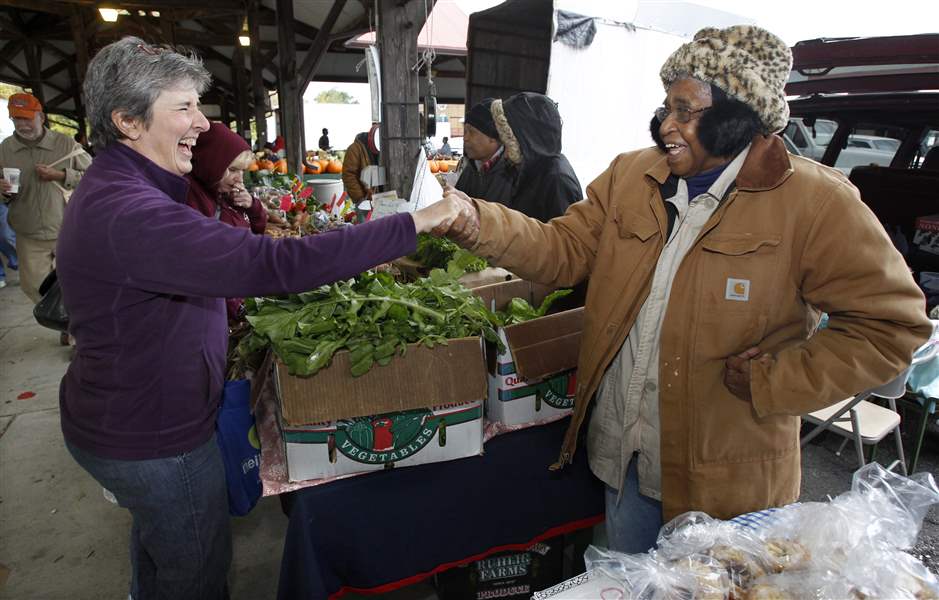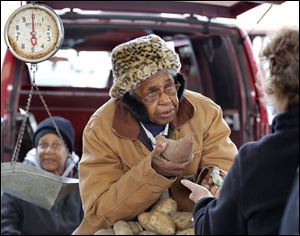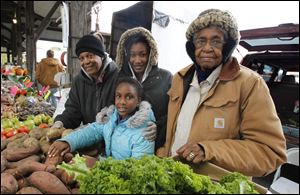
Toledo market fixture retiring at 90
A farmer’s life sowed in heart and hands
10/23/2011
Katie Thomas talks to a customer at the Toledo Farmers' Market on Saturday.
The Blade/Dave Zapotosky
Buy This Image

Katie Thomas and family at the Farmers' Market in Toledo, Saturday. Katie, 90, will be retiring from selling at the market.
Katie Thomas liked the business when she was 6 or so, walking with her grandmother Emma Epps Gibbs several miles into Yazoo City, Miss., peddling okra, butter, and fresh milk door-to-door to white people. “People might give us a ham sandwich or an orange or clothes.” It was the 1920s.
“She had a basket on her head and a pail on each arm. And I’d be leading a horse with a stack of [live] chickens in gunny sacks, their heads sticking out,” Mrs. Thomas says.
She still likes it. “I’m a people person.”
She started selling vegetables out of her old station wagon in the 1940s, and at the Toledo Farmers’ Market in 1952 after the NAACP succeeded in obtaining a stall for her.
Saturday will be her last day at market.
“I’m 90 years old!” is her simple explanation for retirement.
She splays her large hands on the kitchen table, marveling at what amazing tools they have been for nearly a century.
“These hands here have did some work!” she exclaims, Mississippi flavoring her speech.
At last weekend’s market, she sat on a folding chair, bundled up next to an electric heater behind the booth loaded with corn and red and brown sweet potatoes. Her daughter, Ella M. Hall (“I call her boss lady”), and great-grandchildren, Ramon Labiche, 20; Travinea McDonald, 15, and Eleah McDonald, 8, served customers.
“I was born with pretty good mother wisdom,” she says, tapping her head with a long finger. It’s a hard head, she admits.

Katie Thomas and family at the Farmers' Market in Toledo.
The Great Migration
She recalls a grandfather who was secretly taught to read by a white woman he worked for — he, in turn, taught Katie and others the alphabet and spelling as they lay on their stomachs around the fire at night; and a grandmother who freely walked off African soil as a girl and onto a ship bound for the New World, believing she’d be reunited with her family. Upon arrival, she was put on the auction block. “She’d sing African songs to me.”
Forgoing eighth grade, which would have cost $1 a month at the one-room school for black children, young Katie Gibbs went to work for Miss Shirley, a white lady married to a mail carrier, making $1.75 for a seven-day week. Between 6 a.m. and 1 p.m., she’d cook a big breakfast and lunch, wash dishes, iron, and clean house. “They would always give you whatever [food] was left over.”
She also climbed into the back of trucks, joining workers headed for the fields. A strong 5 foot, 8 inches (from which age has stolen an inch), she could pick 400 pounds of cotton a day. That’s where she met Henry Thomas, before he left to serve in the Navy during World War II. Upon his return, they ventured north, seeking a better life and education for their children. She was 24; he, 26 in October, 1946, when they and Ella, their oldest, got on a bus, leaving the younger four with relatives.
“It was a Jim Crow bus until Indianapolis, where you could sit wherever you wanted. The whole back of the bus was full of black folks leaving the South,” she says. “It was a great migration. These men hadn’t been away from home before the war. I think all the black people I knew who had people in the military went north.”

Katie Thomas talks to a customer at the Toledo Farmers' Market on Saturday.
Back to farming
In Toledo, they joined her uncle, who lodged in a five-bedroom home on Avondale Avenue. They rented one of the rooms, sharing the stove and bathroom with four other families. Things happened quickly. She enrolled Ella in school.
“My friend knew somebody and two days later, I went to work for a Jewish family in Ottawa Hills for $5 a day and car fare. She was really nice. I didn’t know about electric irons and she taught me a whole lot of modern stuff.” Mrs. Thomas had always heated irons on the wood stove and in the fireplace.
Mr. Thomas found work at General Mills for $1.01 an hour, with plenty of overtime. They saved, and in a year put money down on three acres in Springfield Township and bought a 1934 vehicle. After they cleared the land, a preacher laid a cement-block foundation and told them how to build a three-room house. “When we got the rest of the kids [from down South], we built three more rooms.”
It had wood stoves for cooking and heating, a pump for water, kerosene lanterns, and an outhouse with a gunny sack for a door. The first convenience was a phone line, shared by nine households. Indoor plumbing in 1956 put the outhouse out of business. “Everybody had an outside john out here.”
The boys felled trees and chopped wood for fuel. “We used oak wood to cook. Didn’t everybody?” she says. “It was good heat that would just warm you through. Better than electric heat.”
She planted a big garden and took the excess to the Ottawa Hills family for whom she kept house. They owned a grocery store and encouraged her to sell her produce.
“I wanted to get back to what I had been doing.”
‘I get right back up’
She took other jobs, sorting mail for the post office and picking tomatoes for $10 a day. But farming allowed her to be home with the children: It taught them how to work and it was what she knew.
They cleared more land, sometimes setting fire to the woods. “The fire department came out [several times], but they never took me to jail and called me a fire bug.”
They expanded, renting 10 acres and working it with a horse and a mule until one day, she marched into her bank for a loan (“long braids down my back, a straw hat, and boots”). “We had good credit all our life.” She aimed to buy a used tiller, disc, and tractor. “I liked that. I used to drive it down south.”
At auctions they bought cows, chickens, and hogs, fed in part by the waste corn Mr. Thomas’ co-workers bagged up for disposal at General Mills, and he brought home. Together, they hunted rabbits and pheasants with their hounds. “She was a better shot than my father,” says daughter Ella Hall, a retired nurse.
She was a good farmer too but ran into a wall when she tried to sell her produce. The farmers’ market manager told her no stalls were available.
“I tried to get a stall at the market. I tried and tried and tried. See, I’m a pusher. I climb up and if you knock me down, I get right back up.”
‘A nice life together’
So, three times a week, she packed a ‘37 Ford station wagon with produce and children and drove the neighborhoods off Dorr Street, ringing a hand bell out the window to announce the arrival of fresh peas, butter beans, okra, tomatoes, poke salad, corn, and wild mustard. “The kids would go to the doors and ask what people wanted to buy.”
Adds Mrs. Hall: “We got to know the city of Toledo like the back of our hands.” It was a good childhood, she says, despite the hard work.
Mrs. Thomas continued seeking a booth at the market, sometimes baking a pound cake to sweeten up the manager. “I thought I had a right to sell at the market. Everybody else who wanted a space had one.”
Moreover, she knew the children would be safer at the market than traipsing up and down the streets.
She contacted the National Association for the Advancement of Colored People, which sent a three-person team from Columbus to check out the market and the Thomas farm. When she got a booth in 1952, she discovered something: “They had a whole bunch of stalls they weren’t even using.”
For a time, she and Mr. Thomas would situate the children and bushels of vegetables and even chickens at the stall, then drive their route, selling through the neighborhoods that had come to know them. The kids became savvy at weighing, selling, making change, and thanking customers.
“And they did good in school from doing that stuff.”
The market, open three days a week, was always crowded. She’d pick and load bushels on Monday, Wednesday, and Friday for market on Tuesday, Thursday, and Saturday.
“When he [Mr. Thomas] found there was some money in it, we got another tractor.” He had a booming laugh that rang through the aisles, says Carolyn Witt, who sells fruit at the market. And he’d embarrass Mrs. Thomas by hollering out her pet name, Poopsie. “I said, ‘Don’t be doing that!’?” When he got dementia, she cared for him. He died in 2008.
“We had a nice life together; Bahamas, went on a cruise with the two young ones.”
‘Good morning’
She and her husband had expanded the house and put three roofs on themselves. In winter, when pipes to the septic tank froze, they’d heat water in the kitchen and pour it on the pipes. Eventually, the one-story place needed $50,000 worth of work.
“It was raining outside and leaking inside.”
When they learned about modular homes, they inquired, and their credit was good enough to get one on their Eber Road property 13 years ago. The old place was demolished.
It’s cozy, full of photos, jars of clove-scented pear preserves on the kitchen counter, and good things on the stove. “Push a button, I got air. Push a button, I got heat.” It’s tidy, despite her relationship with domestic maintenance: “I hate housework.”
It’s the outdoors that’s won her heart.
She had several miscarriages, two stillbirths, and gave birth to two children after she turned 40. Six surviving offspring range from 48 to 71.
“They’re all good cooks and good workers. That’s the way I trained them.”
Most are retired: One’s a nurse, two were nurses, one is a school psychologist with a doctoral degree, one was a mechanic, and another, a grocery-store cashier. They’ve given her 14 grandchildren, 27 great-grandchildren, and two great-great-grandchildren. None wants to farm.
Come spring, she and Ella will sow seeds, and when the long Kentucky Wonder beans, tomatoes, and sweet potatoes mature, they’ll pile them on the old self-serve wagon in front of her home. There’s a scale for weighing, a sign listing prices, and a small money box.
She’ll miss the market, the farmers, and telling customers how to cook what she grows, but she’ll be able to pace herself in the garden without having to cut, wash, and load boxes into the ‘94 Dodge step van every Friday. She’ll still be in the field, bending at the waist.
“You get up early in the morning and the birds go ‘Cheep! Cheep! Cheep!’ The trees is bowing their heads at you. It’s a nice time. Good morning, trees! Good morning, world!”
Contact Tahree Lane at: tlane@theblade.com or419-724-6075.